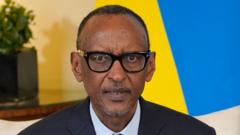On a sun-drenched field near Waterloo, Belgium, an annual tradition unfolded, reviving the 210th anniversary of a pivotal battle in European history. Among the 2,200 participants, an American named Mark Schneider portrayed the legendary French leader Napoleon Bonaparte, energizing a crowd of 17,000 with cries of “Vive l’Empereur!”
Riding proudly on a white horse, Schneider bore a striking resemblance to history's Napoleon — standing at around 5-foot-6 inches tall and sharing his angular features and captivating gray-blue eyes. Yet, there was an intriguing twist: Schneider, originally from Long Island, spoke with a distinctly American accent described as “quite horrific” by the event's organizer, Arnaud Springuel.
Despite the unexpected accent, the re-enactors and spectators seemed unfazed. Springuel noted that many people do not anticipate such a vocal difference from a figure synonymous with French heritage. Schneider secured his role as Napoleon over a competitive pool of contenders from regions steeped in Napoleonic history, including Belgium and Italy. His compelling presence and ability to command respect, crucial for the role, made him an exceptional choice.
The re-enactment attracted both history buffs and curious onlookers, significantly marking its largest turnout in a decade. Organizers celebrated the event as a meaningful homage to a battle that altered the course of European history. Schneider's captivating portrayal and enthusiasm not only rekindled the legacy of the French general but also illustrated the universal appeal of historical narratives, even when they are carried out by an American in a bicorne hat.






















